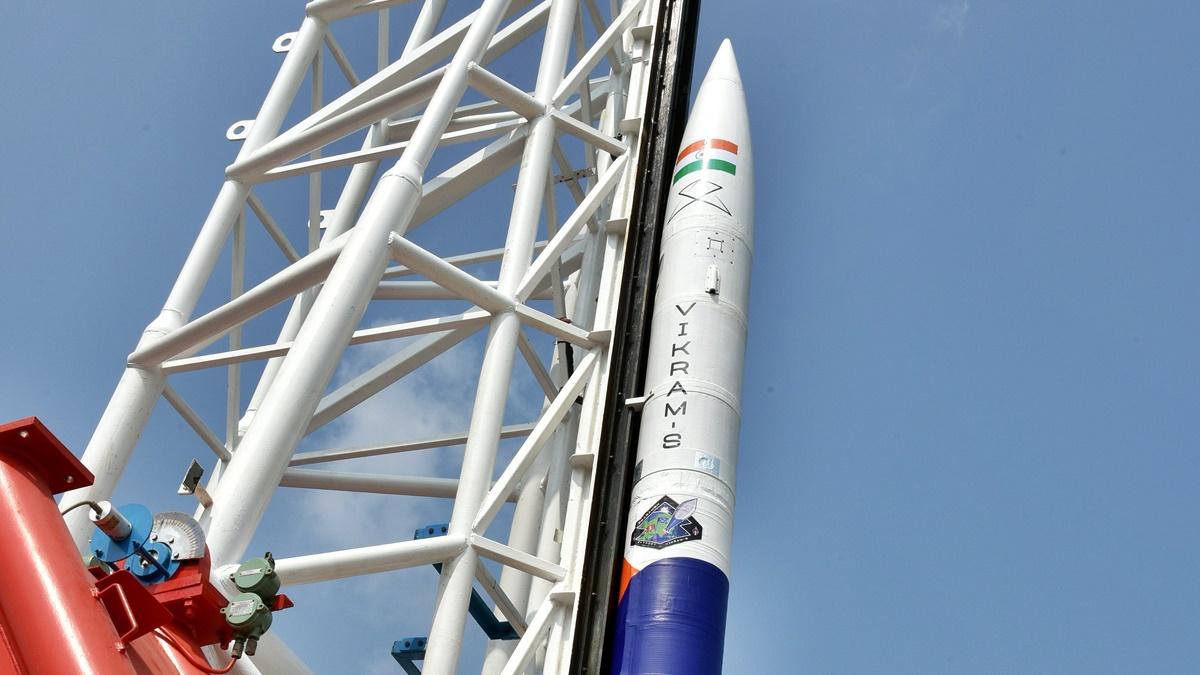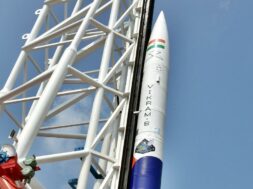
Manas Dasgupta
NEW DELHI, Nov 18: India’s private sector formally entered the space industry on Friday, so far dominated by the government-owned Indian Space Research Organisation (ISRO) as the sole player, with the successful launch of the country’s first privately developed rocket Vikram-S from the spaceport in Sriharikota.
Developed by Skyroot Aerospace, a four-year-old startup based in Hyderabad, the rocket was launched with support from ISRO and IN-SPACe (The Indian National Space Promotion and Authorisation Centre)
It was a historic moment when Vikram-S was lifted off precisely at 11.30 AM. The 6-metre tall vehicle hit a peak altitude of 89.5 kilometres and then splashed into the Bay of Bengal about five minutes after the launch. This mission was titled Prarambh. The rocket Vikram-S is a single-stage solid fuelled, sub-orbital rocket developed over two years by incorporating advanced technologies including carbon composite structures and 3D-printed components.
Congratulating ISRO and IN-SPACe, Prime Minister Narendra Modi said the rocket launch was an “important milestone” in the journey of India’s private space industry.
The rocket carried three payloads built by Andhra Pradesh-based N Space Tech India, Chennai-based startup Space Kids and Armenian BazoomQ Space Research Lab.
Vikram-S soared to an altitude of 89.5 km after its launch and met all the parameters, Skyroot Aerospace said attaching a YouTube link of the flight. “We made history today by launching India’s first private rocket. It is a symbol of new India, and just the Prarambh (beginning) of a great future.” Pawan Kumar Chandana, Co-Founder Skyroot Aerospace, said.
Explaining that satellite launches will play a crucial role in future, Bharath Daka, the other co-founder added, “The maiden launch has proved our technology. Value creation is key in this space. We will be able to prove our capability to our investors”.
Developed by a 200-engineer team within a record time of two years, Vikram-S is powered by solid fuelled propulsion, cutting-edge avionics and a carbon fibre core structure.
The rocket launch will help test and validate the majority of the technologies in the Vikram series of orbital class space launch vehicles, including many sub-systems and technologies that will be tested across the pre-lift off and post-lift off phases of the launch, according to Skyroot Aerospace.
With a body mass of 545 kgs, length of 6m, and diameter of 0.375 meters, Vikram-S is one of the most affordable rockets in its category, globally.
This was a technology demonstration flight to showcase the capabilities of the company. The rocket will help validate the technologies that will be used in the subsequent Vikram-1 orbital vehicle of Skyroot that is planned for launch next year, subject to technical clearance by IN-SPACe, Chandana said.
Founded by Pawan Kumar Chandana and Naga Bharath Daka in June 2018 Skyroot Aerospace is a two-time national award-winning space startup, with 200 employees, and is the largest funded private space start up in India with ₹526 crore raised as capital till date. “We started four years ago and when we started there was no policy but we took that leap with faith. But now the policy has come up and we got support from ISRO,” Mr Chandana said. “Vikram-S rocket meets all flight parameters – 89.5 kms peak altitude achieved and completed required mission,” he added.
At a press meet after the launch Jitendra Singh, Union Minister of State (Independent Charge) Science & Technology; Minister of State (Independent Charge) Earth Sciences; MoS PMO, Personnel, Public Grievances, Pensions, Atomic Energy and Space, called this a “New beginning, a new dawn. This is the beginning of building India’s own space ecosystem.”
He pointed out that Prime Minister Narendra Modi, opened up the space sector for private stakeholders in June 2020 and this has enabled unlocking of the immense potential of the Indian Space Sector. S. Somnath, Chairman, Indian Space Research Organisation (ISRO) and Secretary Department of Space (DoS) said, “We thought it’s a difficult journey but they (Skyroot team) proved us wrong.”
Dr Pawan Goenka, IN-SPACe Chairman, said at least 150 start-ups have shown interest in the space sector. “Till date, IN-SPACe has received more than 150 applications from Space NGEs for Authorization, Facilitation, and Promotion. So far we have given authorisation to five,” he said.
The IN-SPACe chairman said the maiden rocket launch for Skyroot Aerospace was perhaps the most important milestone for the Indian private space sector since the space reforms announced by Government of India and hints at the rapid transformative journey we’re witnessing in India’s space sector. “Though one small step, it is a giant leap to demonstrate the capabilities of the Indian Space sector,” he added.
The IN-SPACe has been operating as a single-window, autonomous nodal agency of Department of Space (DOS) to boost the private space sector economy in India. It has given five authorizations to the Space NGEs for undertaking space activities in India, in six months and signed Sixteen MoUs.
Friday’s mission is considered to be a significant milestone for Skyroot Aerospace as it would help test and validate majority of the technologies in the Vikram series of orbital class space launch vehicles, including many sub-systems and technologies that would be tested before lift-off and post lift off phases of the launch.
‘Fun-Sat’, a 2.5 kgs payload belonging to Chennai-based aerospace startup Spacekidz, has been developed by students from India, the United States, Singapore and Indonesia. The 545 kg Vikram launch vehicle consists of the Vikram II and Vikram III series.













